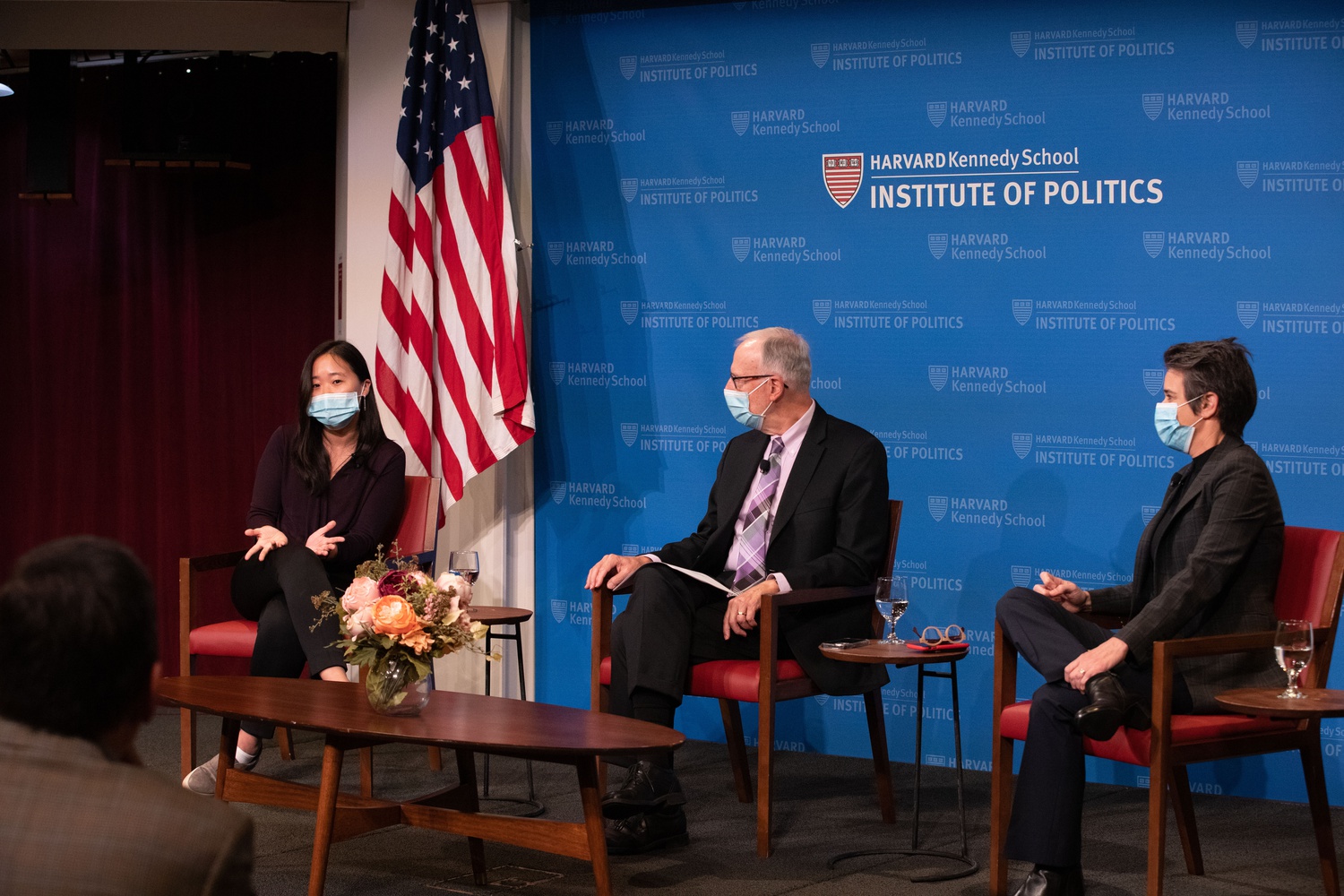
News
Harvard Grad Union Agrees To Bargain Without Ground Rules

News
Harvard Chabad Petitions to Change City Zoning Laws

News
Kestenbaum Files Opposition to Harvard’s Request for Documents

News
Harvard Agrees to a 1-Year $6 Million PILOT Agreement With the City of Cambridge

News
HUA Election Will Feature No Referenda or Survey Questions
Political Journalists Address the Connections Between Local and National Politics at IOP Forum

Washington Post journalist Seung Min Kim and Cook Political Report Editor-in-Chief Amy E. Walter discussed the intersection between national and local politics in a forum hosted by the Harvard Kennedy School’s Institute of Politics on Tuesday evening.
Moderated by Washington Post chief correspondent and IOP Resident Fellow Dan Balz, the forum addressed pressing local political issues and their relevance in the national political arena.
Kim said Biden faces a challenge in juggling both his domestic agenda and his international and climate goals. She noted the president’s upcoming international trips to Glasgow and Rome have been “overshadowed” by coverage of his domestic agenda.
“It's just been basically a giant game of Whack-a-Mole — like you feel like you fix one problem and then another problem pops up,” Kim said. “And that's just been such a really confounding puzzle for Biden, for Democratic leaders.”
Walter said Biden began the summer with “a plan that looked pretty good” — expecting a strong economy and recovery from Covid-19— but the president’s goals lost momentum as the Delta variant spread.
“Everybody has a plan until they get punched in the mouth,” she said, referencing a quote from boxer Mike Tyson.
“Starting in June or July, Covid became much less of a hot [vaccination] summer and much more of a hot mess summer,” Walter added.
Kim and Walter both noted the national implications of the upcoming gubernatorial election in Virginia, scheduled for Nov. 2. Former Governor Terence R. “Terry” McAuliffe, a Democrat, will face off against Republican candidate Glenn A. Youngkin.
“What's been interesting is just to talk to House Democrats, particularly about what impact a Terry McAuliffe loss would have on their agenda and their efforts to pass the big social spending climate package,” Kim said.
Virginia resident Tarina K. Ahuja ’24, who attended the event, said she believes the election may help redefine the relationship between state and national politics, along with the future of the Democratic Party’s mobilization efforts.
“Not only is it important for the future of my state, of my home, but it’s also important for the nation and thinking about what is the future of the Democratic Party,” Ahuja said.
Kim also said congressional democrats are looking to this election to gauge their chances in the 2022 midterms, given that the party in the White House has historically performed poorly.
Walter added that constituents previously evaluated their congressperson and the president’s performance separately, but the internet and the loss of local news has caused members of Congress — often viewed as accountable to their states and districts — to be “lumped in with the national.”
“They were able to sort of be seen as something separate than what was going on in Washington,” she said. “So you could hate the person in the White House, but still like your person.”
Robert Fogel ’25, an IOP member, said the event fit in well with this semester’s theme of democracy.
“A big point of these forums in general, but particularly tonight, is to make students think about the current political situation and what they may believe to be true about a small election actually has broader implications and greater meanings for the nation at large,” he said.
Want to keep up with breaking news? Subscribe to our email newsletter.
Related Articles
Most Read
- 3 Harvard Students, 2 Recent Grads Had Visas Revoked
- As Trump Waits for Harvard’s Reply, Governing Boards Meet in Harvard Square
- Garber Promises To ‘Engage’ With Federal Antisemitism Task Force After Funding Threats
- Harvard’s Hyperfixation on Israel Is Academically Unserious
- Harvard FAS Elects 6 New Members to Faculty Council
